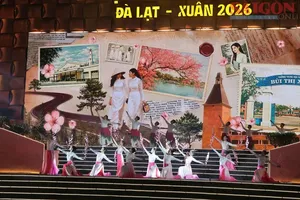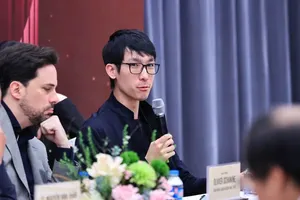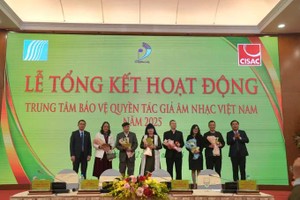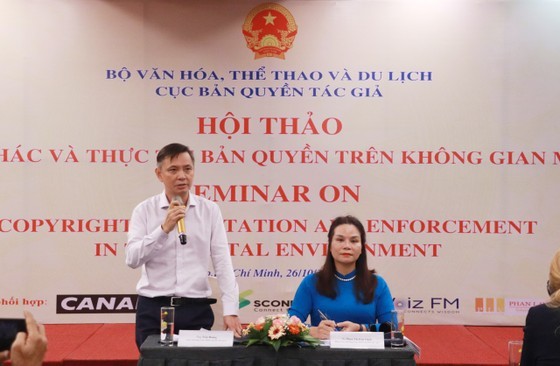 |
Mr. Tran Hoang, Director of the Copyright Office of Vietnam, speaks at the seminar. |
Utilizing digital technology to exploit and protect copyrights on the Internet has become imperative.
Challenging copyright enforcement
During the recent "Copyright Exploitation and Enforcement in the Digital Environment" seminar held in Ho Chi Minh City, Mr. Le Hoang Thach, Director of WEWE Technology Company - the owner of the Voiz FM audiobook platform, openly expressed his frustration. He stated that taking advantage of technological conveniences, copyright infringement has mushroomed rapidly, resulting in direct financial harm to the State budget and publishing entities and a detrimental impact on the reading culture. Meanwhile, issuing warnings and removing infringing content merely scratches the surface without addressing the root problem, which is the revenue generated from advertisements, further exacerbating copyright violations. Mr. Le Hoang Thach also highlighted that copyright infringements related to audiobooks primarily manifest in three forms: USB audiobooks/link sharing, YouTube audiobook channels, and websites.
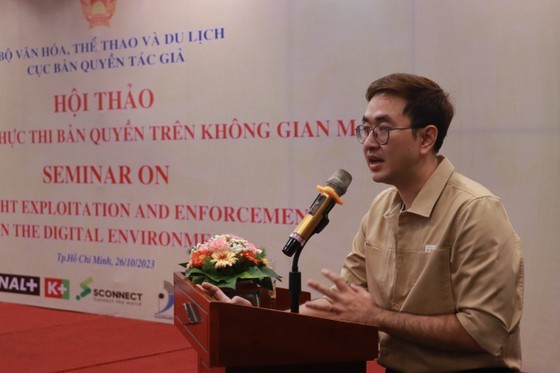 |
Mr. Le Hoang Thach, Director of WEWE Technology Company, speaks at the event. |
Lawyer Pham Van Anh, Head of the Legal Department at Sconnect Vietnam Investment Technology and Services Company Limited, commented that the exploitation and safeguarding of intellectual property rights, specifically in the realm of internet-based copyright for audiovisual works, encounter various challenges. Copyright violations in this sphere encompass actions such as unauthorized public dissemination of audiovisual works, full or partial replication of the content, alterations or modifications to the work, and the misuse of content removal mechanisms to inflict substantial harm on rights holders and cultivate unhealthy competition.
Lawyer Pham Van Anh mentioned that SConnect Vietnam had sent multiple letters to Google and YouTube to report copyright infringements but had not received any responses from these entities. He pointed out that communication, contact, and information exchange with Internet service providers such as YouTube and Google were difficult due to their lack of and representative offices and responsible persons in Vietnam. He noted that this had resulted in inadequate and ineffective collaboration with these platforms in adhering to Vietnamese law.
As per Lawyer Vo Trung Tin of Phan Law Vietnam Law Office, the commercialization of digital content, especially audiovisual works, brings substantial economic benefits to copyright owners. The primary value of digital content is rooted in intangible property rights, and in the current era of technological advancements, unauthorized copying of this content has become relatively straightforward. Therefore, the authentication, safeguarding, and utilization of digital content by copyright holders continue to encounter numerous complexities and obstacles in practice.
Technology utilization promotion
Despite the extensive efforts made by copyright regulatory and enforcement authorities, the fact remains that copyright infringements in the digital realm continue to pose complex challenges in Vietnam. Both local and international experts identify the most substantial obstacle as the lack of automated systems for detecting, alerting, and preventing copyright violations in the online space. Current prevention methods are predominantly reliant on manual and administrative procedures, rendering them sluggish and ineffective.
On a global scale, significant progress has been made in the detection and prevention of online copyright violations, primarily through the utilization of intelligent, fully automated tools that cover everything from detection and alerts to resolution. Human involvement becomes necessary only in the event of disputes. Mr. Simon Minkowski, Head of Copyright Protection at Canal+ Group, a prominent French media conglomerate, noted that their organization currently deploys the Canal+ system to identify and block unauthorized access to their digital content. He emphasized that efficient and rapid prevention of online copyright infringements is crucial. Hence, automated tools are indispensable as they facilitate the rights protection for all parties involved. Presently, their system is used in France, Italy, and some African countries, Mr. Simon Minkowski revealed.
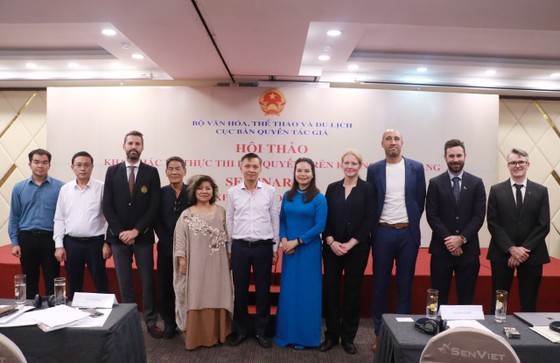 |
International experts attending the seminar |
Mr. Tawfik Dabboui, Project Director at Nagra Group (Switzerland), presented the Nagra Analysis System (LNA). From a legal perspective, LNA is developed in alignment with international intellectual property regulations and copyright-related decrees. Technically, LNA can examine websites that utilize copyrighted content, assess the legality of such usage, compile a list of unauthorized sites for blocking, and monitor and measure the impact of these blocking measures. What sets this system apart is its feature that allows copyright owners or government agencies to directly oversee the effectiveness of infringement prevention. This enables them to proactively adjust or lift blocking orders, mitigating the risk of erroneous or incomplete blocking actions.
In Vietnam, the utilization of such systems remains relatively limited. For instance, the Vietnam Center for the Protection of Music Copyright (VCPMC) has represented more than 5,000 authors and established bilateral cooperation agreements with 82 foreign collective management organizations (CMOs), collectively representing over 5 million authors and rights holders from 116 countries and territories. Nevertheless, the adoption of new digital technology is primarily focused on digitization, data storage, control, and international data exchange, facilitated by software tools like Mis@asia, Cisnet, AiBiz, and Pronto.
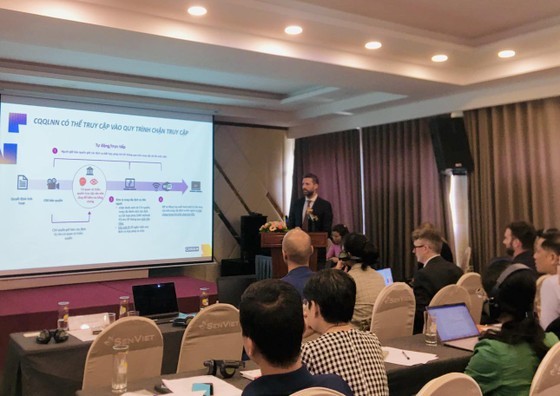 |
An international representative shares solutions at the seminar. |
Moreover, VCPMC has been developing software for monitoring music content on well-known digital platforms such as YouTube, Facebook, Deezer, Spotify, Must, and Apple. Mr. Mai Thanh Huy, a representative from VCPMC, emphasized the importance of digital technology in the realm of copyright protection and exploitation, as it enables automated, accurate, and efficient tracking of online music usage. Implementing digital technology will facilitate VCPMC to safeguard the rights of music authors on a global scale.
The gap between how foreign countries and Vietnam address this matter remains substantial. Given the present circumstances, besides enhancing the legal framework and supplementing explicit penalties for intermediary service providers, there is a pressing necessity to adopt digital technology for copyright exploitation and protection.




